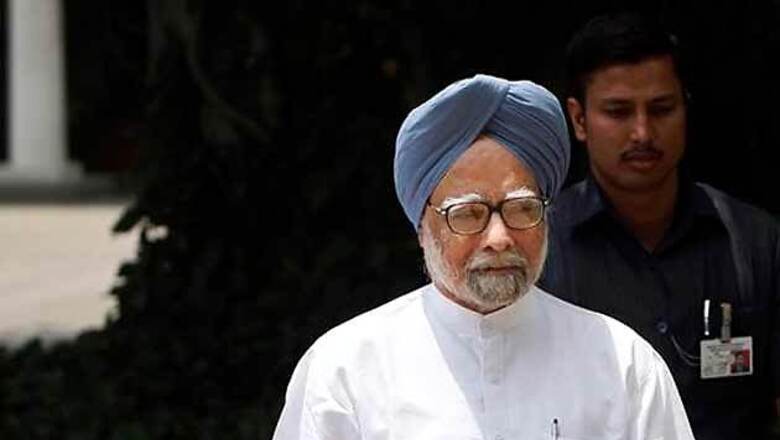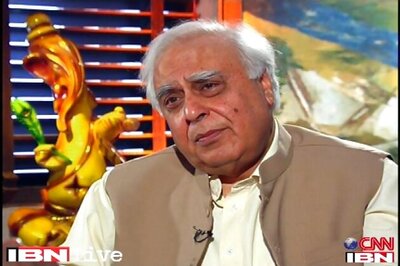
views
At the most stimulating session of the World Economic Forum for India 2012 on the opening Wednesday, captains of the Indian and international industry and the Indian government agreed on the fundamental premise that faster economic growth was not just essential for the success of business but also to ensure distributive equity among India's people. The session titled 'rebooting India' comes at a time when the country's high growth rates of 8-9 per cent has been revised downwards to 5.5 per cent, an all-time low since 2004. More than 700 business leaders from as many as 43 countries are taking part in various deliberations at the meet being held in the National Capital Region of Gurgaon.
What they differed on is the pace of reforms, the frequency of reforms, whether reforms were being sacrificed for the sake of political expediency, whether the Centre has a weak government and if other institutions like the judiciary and the civil society were creeping into spaces reserved for executive decision.
While Union law minister Ashwini Kumar acknowledged that there was a constitutional imbalance which needed to be restored, he nonetheless said that policy initiatives and regulatory reforms would see average growth touch 8.2 per cent in the 12th five-year plan period. He said, "There is complete unanimity within the Congress party and the UPA government that faster, inclusive and sustainable growth was the way forward."
Ashwini Kumar drew from the Congress core leadership's affirmation in last Sunday's Delhi rally that foreign investment was welcome in all sectors of Indian economy.
However, the industry honchos were not really convinced by the talk and called for action on the ground. Natarajan Chandrasekaran, CEO and MD of Tata Consultancy Services (TCS), said comfort and confidence, the two prime requisites for business were at an abysmal low. "We have had high inflation, low growth and mounting fiscal deficit. And the government has failed to rein in inflation. Just keeping interest rates high does not stem inflation."
He spoke about the importance of executing projects and policy. Pointing out the success stories like Delhi Metro, Konkan Railway and Delhi Airport, he said the management and working skill was never in question. "It's a matter of will and evolving a follow-through plan on execution. The last few months have brought in some positive momentum but definitive timelines are required to ensure that a repeat of the last three and a half years does not occur."
Paul Bulcke, CEO of Nestle, Switzerland, however, said, there was no need of a reboot. "You need reboot when you crash. As I see it, India needs to fix some aspects and it will be back on track."
Bulcke said the gravity of India's past, its rich history, its size and complex politics made the country apprehensive of taking hasty decisions. "I look at society as a painting. The government provides the frame and nothing more. It's for the people, entrepreneurs to colour the canvas. However, the frame should not be so wide that it leaves very little space to paint. That kills entrepreneurial spirit. That has been India's problem."
He added, "Everybody knows what needs to be done. The point is to get it done." He also called for greater transparency and simplicity in processes.
Gita Gopinath, professor of economics at Harvard University, however, did not agree with most people. She did not think India's problems were about perception and marketing.
The World Bank rates India at 132 out of 183 countries in terms of ease of doing business. In terms of enforcement of contracts, it ranks 182 out of 183 and in terms of construction permit 181. But Gopinath went further deep, questioning whether the high growth actually was inclusive and if it benefitted most Indians.
"There is no consensus on reforms in the country. Each percentage growth of Indian economy has benefitted negligible proportion of poor people as compared to China or South Korea. India needs a strong manufacturing base which today accounts for just 16 per cent of the GDP. The progress from agriculture to service economy can't exclude the step of manufacturing. Manufacturing brings money to large sections of the society. What is also desperately needed are labour reforms," she said.
Rahul Bajaj, chairman of Bajaj Auto, was of the opinion that all stakeholders in the Indian growth story were responsible for the air of low confidence and pessimism. "What is good for the country is not important. Political opportunism is the truth. The Congress and the BJP largely agree on the economic policy measures. Yet, the ruling party takes populist measures, the Opposition disrupts the House for the sake of opposing," he said.
While pointing out that the land acquisition process and environmental clearance processes needed to be reworked, he said, "This atmosphere of no clearances, no investment, no labour market reforms can't continue. Corporate governance regulations, GST, Direct Tax Code are all the needs of the hour. But who will bell the cat," he asked.
The role of Indian media was also criticised by a lot of the panellists. However, they all agreed that reforms were imperative and that a consensus needed to be evolved among all stakeholders including the government, the Opposition, the businesses and the media, for a more clearer and less spasmic recourse to economic reforms.



















Comments
0 comment